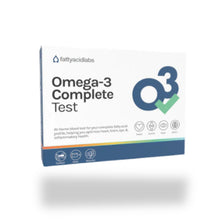
Can Omega-3 help the body cope with everyday stress?
Can Omega-3 support the body's response to everyday stress?
What the research says about nutrition, nervous system balance and modern mental stress
Why deep breaths aren't always enough
In today's world, constant notifications, decision fatigue, and lack of recovery are part of everyday life. The body adapts as best it can – but modern lifestyles can create extra strain on the systems that regulate energy, mood, and immune balance.
Among the many factors that influence how we feel, nutritional status plays a bigger role than we often realize. In recent years, researchers have examined the connection between Omega-3 fatty acids and the body’s natural stress-related mechanisms – with exciting results.
Omega-3 and the Brain: A Complex Relationship
The brain is made up of almost 60% fat, and Omega-3s – particularly DHA and EPA – are important structural components of cell membranes, including those of neurons. These fatty acids are involved in important physiological functions related to cell signaling, immunomodulation, and oxidative balance.
Some clinical studies suggest that Omega-3 status may be linked to:
-
A more balanced immune response during challenging periods
-
Lower biological stress reactivity during acute stress
-
Maintained cell health and structure over time
-
Support for emotional resilience in everyday life
These observations are based on randomized, placebo-controlled studies and are still being investigated further.
What a study showed
In a study at Ohio State University, 68 healthy participants were given either a placebo or 2.5 grams of combined EPA and DHA daily for four months. The group receiving Omega-3 showed differences in certain biological responses after exposure to stress – including markers such as IL-6 and cortisol.
Another study showed that even lower daily doses (approximately 1.25 g/day) were linked to positive immune-related outcomes.
These results do not constitute a treatment – but they point to how nutritional status can affect the body's response under stress.
Omega-3 and the body: What researchers are investigating
Immune signaling
EPA and DHA are being studied for their role in supporting a normal inflammatory response – especially when the body is under stress.
Cell protection
Omega-3s are involved in protecting cell membranes from oxidative stress – a factor that can affect how we age at the cellular level.
Regulation of the HPA axis
Some research suggests a possible role in supporting the normal function of the body's stress hormone system.
Mental well-being
Meta-analyses have shown a relationship between Omega-3 supplementation and perceived mood stability – even in populations without clinical diagnoses.
How much omega-3 do we get?
Despite public health recommendations, many people in Europe consume less Omega-3 than is considered optimal for maintaining good health. Studies show that even those who eat fish 1-2 times a week may be below ideal levels of EPA and DHA intake.
When choosing an Omega-3 supplement, here’s what you should look for:
-
Optimal ratio between EPA and DHA (higher EPA than DHA)
-
Bonus if the supplement also contains DPA
-
Natural triglyceride form (for higher bioavailability)
-
Laboratory testing for oxidation, purity and potency
-
Transparent origin (e.g. Friend of the Sea certification)
ArcticMed laboratory tests our Omega-3 products
Why nutritional support is more important than ever
Energy dips, mood swings, and mental fog are becoming increasingly common in today's society. While lifestyle factors like exercise and rest are crucial, your nutrition is the foundation for how your body adapts and recovers.
Omega-3 is a small daily habit with great biological significance.
Closing thought
Everyone experiences stress differently – and recovery is just as individual.
Support your body. Strengthen your resilience. Start with what you can control.
Take it. Test it. Trust it.
Scientific references
Kiecolt-Glaser JK et al. Omega-3 supplementation lowers inflammation and anxiety in medical students. Brain Needs Immune . 2011.
Calder PC. Omega-3 fatty acids and inflammatory processes. Proc Nutr Soc . 2010.
Puterman E et al. Omega-3 supplementation increases telomerase activity. Brain Needs Immune . 2013.
Su KP et al. Omega-3 fatty acids in depression: meta-analysis. J Clin Psychiatry . 2011.
Please note: These references are included for educational purposes and do not constitute medical claims or product-specific benefits.






